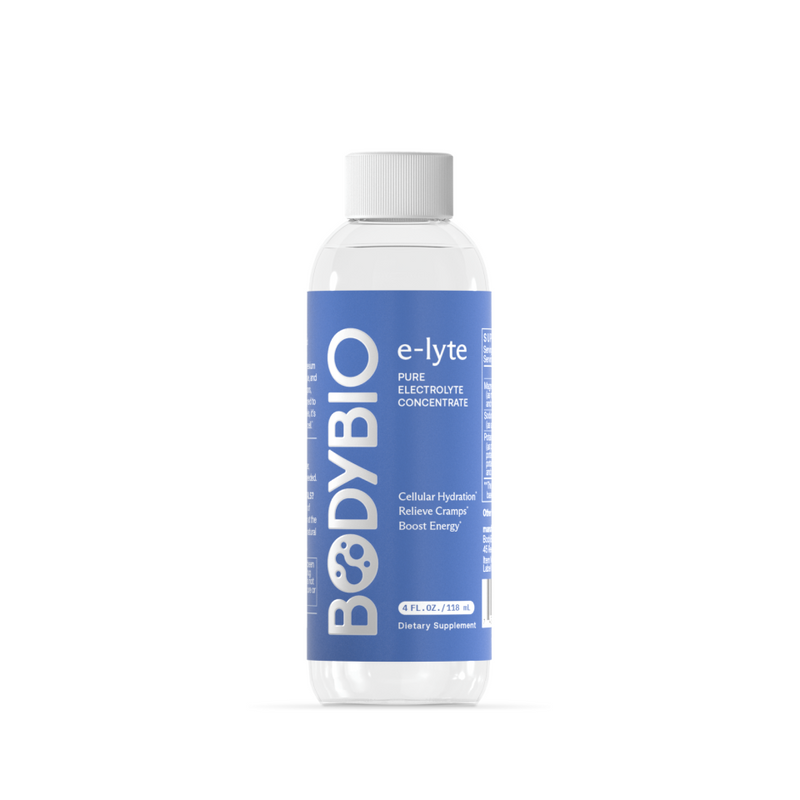Why Do Energy Drinks Make Me Tired? How to Support Consistent Energy Levels
Authors:

Dr. Thomas Wnorowski
PhD, CNCC Research Director, BodyBio & Biomedical Nutritionist
Key Takeaways:
Key Points:
- Energy drinks come to the rescue on sleepy days or highly focused work sessions. But too many of these beverages over time can eventually lead to fatigue, blood sugar crashes, and poor sleep.
- It’s always best to get energy through natural sources — by prioritizing quality sleep, lifestyle changes, and a healthy diet.
- There are natural energy drink alternatives you can use on particularly challenging days. Try adaptogenic drinks, green tea, electrolytes, or even a vitamin B complex.
For most of us, there are at least a few days out of every week where an energy drink seems like a really good idea.
Going from five hours of sleep to a focused and energized eight-hour workday, for example.
Or, pushing through a 3:00 AM road trip when all you want is to crawl into bed.
There’s a time and place for energy drinks. But if drinking them regularly is starting to make you feel more tired, there’s something else going on.
Maybe you’re stuck in a cycle that looks something like this…
Five hours of sleep, energy drink, afternoon slump, energy drink, wired at night, repeat.
Sound familiar?
There’s nothing you crave more than stable energy throughout the day, nodding off at night just about the instant your head hits the pillow, and waking up full of energy the next morning without a blaring alarm clock. But how do you make it happen?
Let’s explore why energy drinks make you tired and what else you can do to encourage stable energy levels throughout the day.
Table of Contents:
- Why Do Energy Drinks Make Me Tired?
- How to Build Sustainable Energy Naturally
- Healthy Energy Drink Alternatives
- Stable Energy Without Glucose Spikes
Why Do Energy Drinks Make Me Tired?
Let’s take a look at the ingredients found in a typical energy drink:
- High-dose caffeine (up to 200 mg)
- Stimulants (even “natural” ones like taurine and guarana)
- Energy-supporting supplements (like B vitamins and ginseng)
- Sugar (for flavor and quick energy)
The goal of an energy drink is to induce focus and stamina quickly. But these ingredients can cause energy crashes later in the day — or mess with hormones, circadian rhythm, and sleep quality. Let’s explore why you feel tired after energy drinks…
Caffeine Crash
When consumed, caffeine blocks a neurotransmitter in the brain called adenosine, which signals sleepiness. Once the effects of caffeine wear off, the same neurotransmitter comes flooding back into your system. We call this a “caffeine crash,” and it’s the reason you could feel even more drowsy a few hours after drinking a caffeinated beverage.
Adrenaline Imbalance
Caffeine can increase neurotransmitter activity in the brain (it’s a stimulant). For those who need a boost of energy, this stimulant effect will get to work right away. However, people with higher levels of adrenaline and cortisol should use it with care. Caffeine increases the circulation of these hormones and can eventually lead to high stress, depression, imbalanced hormones (adrenal and sex hormones), or low energy in the afternoon.
Sugar Crash
A sugar spike followed by a crash could be the reason energy drinks make you tired — especially if you’re insulin-resistant. Any time your blood sugar spikes dramatically, it will also fall dramatically.
So, high levels of processed sugar may lead to temporary energy, followed by extreme fatigue. To remedy this, we recommend eating a protein- or fiber-rich snack before consuming an energy drink (or trying one of the alternatives below). This will help stabilize blood sugar levels, leading to less dramatic highs and lows. Better yet, find an energy drink with minimal or no processed sugar so you can experience the benefits without the adverse effects.
Poor Circadian Rhythm
Imagine you wake up naturally without an alarm clock. You feel energized, alert, and ready to take on the day. This is all the result of your circadian rhythm. Its job is to regulate sleep, wake, and eating cycles — providing stable energy throughout the day.
However, the circadian rhythm is sensitive and easy to disrupt. Energy drinks, poor-quality sleep, excessive screen use, and unpredictable bedtime can all disrupt your natural rhythm, leading to fatigue throughout the day. Energy drinks combined with these habits are usually a recipe for circadian rhythm disruption.
Poor Quality Sleep
Supplements like taurine, B vitamins, and ginseng are known to boost energy levels — but they can be too effective. An energy drink with these powerful ingredients can lead to poor-quality sleep. This means that you wake up fatigued, reach for another energy drink, and repeat the cycle
How to Build Sustainable Energy Naturally
Here are a few crucial lifestyle habits you can use to promote sustainable energy throughout the day. It’s always best to rely on your own body, hormones, and neurotransmitters to keep you alert and active, rather than artificial energy from sugary drinks.
Quality Sleep
Prioritize quality sleep (eight or more hours) so you don’t have to rely on energy drinks and caffeine. Your body wants to feel naturally energized and supported. Quality sleep promotes better hormone cycles, circadian rhythm balance, and sustainable energy levels that don’t easily “crash.”
Morning Sunlight
One of the best ways to boost your energy is to get morning sun. This is essential for your circadian rhythm function, vitamin D absorption, and mood. Take a morning walk with a friend or sit on your porch and watch the sunrise.
Lifestyle Boundaries
“I’ll sleep when I’m dead” is a common phrase, especially among young adults. Forgoing sleep in the name of a career promotion, long hours of studying, or going out on the town well past midnight is considered a badge of honor.
But this lifestyle isn’t sustainable — and it’s not good for your long-term health. The truth is, you can be a successful person while prioritizing rest, boundaries, and even leisure time. You might even be more productive and better focused with eight hours of sleep and fewer energy drinks.
Pair Stimulants with Dietary Fats
If you love energy drinks or can’t imagine eliminating your daily caffeine, consider pairing these drinks with dietary fats. Milk or cream in your coffee, for example, can slow the absorption of caffeine. This means you’ll experience more stable energy levels and fewer highs and lows.
Healthy Energy Drink Alternatives
Building a sleep schedule with healthy lifestyle choices takes time. As you get through the adjustment period, you may need a natural pick-me-up. Here are some healthy alternatives to energy drinks you can reach for…
Electrolytes
Potassium, sodium, magnesium, and calcium can provide a temporary mood and energy boost. These are essential for balancing fluid and creating energy within the cell. Electrolytes are needed for ATP (your body’s energy currency) synthesis and offer a safe pick-me-up you can enjoy any time of day.
Green Tea
While green tea does contain caffeine, it usually won’t cause a caffeine crash. This is because the caffeine is released more slowly into the bloodstream, and it’s paired with L-theanine, a calming amino acid. Sipping on matcha or loose-leaf green tea in the afternoon is a powerful way to support your natural energy levels and reduce the side effects of caffeine. (Not to mention you’ll get a powerful boost of free-radical fighting antioxidants!)
Adaptogen Drinks
Adaptogens are herbs and mushrooms that help you adapt to stress and the demands of daily life. Some adaptogens (like ginseng) are commonly found in energy drinks. They typically work better without the caffeine and sugar additives — and may be a helpful replacement for energy drinks or your morning coffee.
Vitamin B Complex Supplements
If you didn’t already know this, it’s never recommended to take B vitamins at night. These water-soluble vitamins help metabolize and transport nutrients — supporting natural energy levels. If you feel sluggish regularly (or have a chronic illness), you may be depleted in B vitamins. Find a B vitamin complex to take in the morning for better and more sustainable energy.
A Mid-Afternoon Snack
Don’t underestimate the power of a protein-filled afternoon snack — especially if you’re a chronic under-eater (for example, you skip breakfast and eat a salad for lunch). Afternoon slumps often result from a simple lack of fuel. Make sure to balance your meals with fiber, fats, protein, and carbohydrates for optimal energy levels throughout the day.
Stable Energy Without Glucose Spikes
Processed sugar is perhaps the most common ingredient in electrolyte supplements.
But it shouldn’t be.
When you’re chronically fatigued, you need nutrients that support cellular energy, not processed sugar, which leaves you with a glucose crash.
That’s why we created the ultimate electrolyte supplement — to help your cells create stable energy. Our E-Lyte supplement hydrates your cells and helps with the production of ATP — all without additives, crashes, sugar, and unhealthy ingredients.
It’s the ultimate resource to support your transition away from energy drinks and back to natural and sustainable energy.
Alsunni A. A. (2015). Energy Drink Consumption: Beneficial and Adverse Health Effects. International journal of health sciences, 9(4), 468–474.
Farhud, D., & Aryan, Z. (2018). Circadian Rhythm, Lifestyle and Health: A Narrative Review. Iranian journal of public health, 47(8), 1068–1076.
Mwape, R. K., & Mulenga, D. (2019). Consumption of Energy Drinks and Their Effects on Sleep Quality among Students at the Copperbelt University School of Medicine in Zambia. Sleep disorders, 2019, 3434507. https://doi.org/10.1155/2019/3434507
Nowak, D., Gośliński, M., & Nowatkowska, K. (2018). The Effect of Acute Consumption of Energy Drinks on Blood Pressure, Heart Rate and Blood Glucose in the Group of Young Adults. International journal of environmental research and public health, 15(3), 544. https://doi.org/10.3390/ijerph15030544
Reichert, C. F., Deboer, T., & Landolt, H. P. (2022). Adenosine, caffeine, and sleep-wake regulation: state of the science and perspectives. Journal of sleep research, 31(4), e13597. https://doi.org/10.1111/jsr.13597
Tai, X. Y., Chen, C., Manohar, S., & Husain, M. (2022). Impact of sleep duration on executive function and brain structure. Communications biology, 5(1), 201. https://doi.org/10.1038/s42003-022-03123-3

